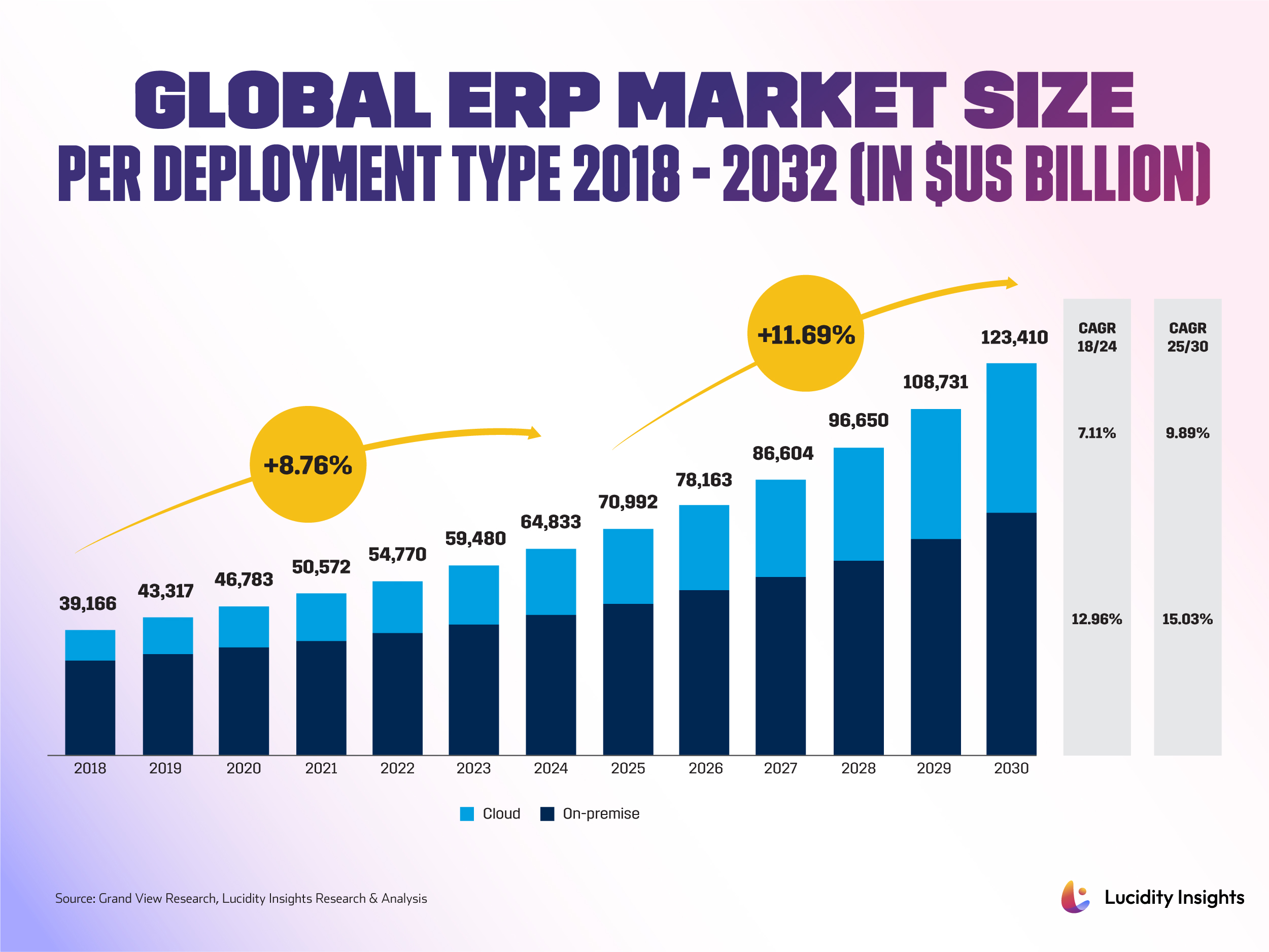Why Startups Are Investing in ERP Systems Earlier than Ever
14 March 2025•
For years, Enterprise Resource Planning (ERP) systems were viewed as expensive tools only available to large, established corporations with complex operations. Startups, by contrast, couldn’t possibly afford, let alone lean into such centralized tools to manage their processes. But times are changing. Today, we are seeing more and more startups, especially from the Fintech space, investing in cloud-based, modular and agile ERP systems at younger stages of the business, reshaping how they operate, scale, and compete.
What’s driving this shift? A convergence of factors unique to today’s business environment. The rise of cloud-based ERP has significantly lowered adoption barriers, providing scalable solutions at low cost, implementable even for the smallest of ventures. The COVID-19 pandemic further accelerated this trend, pushing companies worldwide to embrace flexible working arrangements and adopt systems capable of supporting distributed teams in real-time.
Simultaneously, the growing complexity of regulatory requirements - especially within the Fintech space - and the increasing reliance on data-driven decision-making have made earlier ERP adoption not just beneficial but essential.
The Cloud ERP Revolution
In the past, ERP systems were synonymous with hefty on-premise setups—expensive, resource-intensive, and out of reach for most small and medium enterprises (SMEs). However, the emergence of cloud-based ERP has transformed this narrative, offering a flexible and cost-effective alternative. Cloud ERP solutions are enabling SMEs to adopt these systems earlier than ever.
Between 2018 and 2024, the market for cloud ERP nearly doubled, achieving a CAGR of 12.96%—outpacing the growth of its on-premise counterpart. This momentum is to accelerate over the next 5 years; cloud ERP is forecasted to grow at 15.03% annually through 2030, surpassing US $47 billion by the end of the decade. While on-premise ERP will continue to expand, its growth is expected to moderate, highlighting a paradigm shift.

This shift isn’t just about technology; it’s about meeting the modern demands of agility, scalability, and accessibility. The SME segment is expected to record the highest CAGR during the forecast period. Unlike their larger counterparts, SMEs benefit more from The modular and adaptable nature of cloud ERP, which allows them to implement only the features they need. Market data consistently shows that SMEs are driving demand for cloud ERP, drawn by its ability to streamline operations without overburdening budgets.
For startups, the benefits are clear:
• Lower upfront costs: Subscription-based pricing eliminates the need for significant capital expenditures, making ERP accessible even to cash-strapped ventures.
• Ease of deployment: Cloud ERP systems are faster to implement, allowing startups to focus on their core operations without lengthy disruptions especially as startups are crippled by legacy IT infrastructure.
• Scalability and flexibility: As startups grow, cloud ERP systems can scale seamlessly, accommodating new users, locations, and business functions.
Beyond the operational efficiencies and process improvements that ERP systems traditionally deliver—such as streamlined workflows, enhanced resource management, and centralized data control—cloud ERP is unlocking entirely new opportunities for startups. By removing the limitations of on-premise infrastructure, these systems are not only more accessible but also more aligned with the demands of modern business environments. For startups, this shift is about more than cost savings; it’s about agility, adaptability, and positioning themselves for future growth.
Adapting to the new normal of remote and hybrid Work
The COVID-19 pandemic didn’t just accelerate the adoption of remote work—it redefined the workplace. What started as a necessity during lockdowns has now evolved into a permanent shift, with hybrid and remote work becoming a growing standard for businesses globally.
More startups have embraced hybrid and remote work models as a natural extension of their flexibility and lean operational structures. Unlike larger corporations with established physical offices and legacy more rigid systems, startups often prioritize agility and adaptability, making remote or hybrid setups a strategic choice. This approach enables them to attract top talent, optimize costs, and remain competitive in fast-changing markets.
As startups grow, managing distributed teams and ensuring operational cohesion becomes increasingly complex. Cloud-based and increasingly innovating ERP systems are proving invaluable in addressing these challenges, particularly in facilitating virtual HR processes and enhancing employee engagement within distributed work environments. These systems enable seamless operations by providing employees with the tools and resources needed to work efficiently from anywhere with an internet connection. Their accessibility and adaptability make cloud ERP an essential component for startups navigating the demands of remote and hybrid work.
Consider the example of Remote, a startup that specializes in enabling companies to hire talent from anywhere. By implementing SAP’s cloud ERP system, Remote was able to manage its operations effectively while experiencing rapid growth, expanding to 55 countries and over 650 employees in just two years. The platform provided the structure and visibility necessary to support its hybrid workforce while ensuring efficiency and compliance. As Pedro Monteiro de Barros, VP of Finance at Remote, noted, “Working with a company like SAP allows Remote to scale its operations efficiently and cost-effectively.”

Also Read: SAP Digital Currency Hub: Transforming Cross-Border Payments Through Digital Currencies
Navigating the increasing complexity of regulatory compliance
Globally, companies are grappling with a rapidly evolving landscape of regulatory requirements. From stringent data privacy laws such as GDPR to global anti-money laundering (AML) standards, the compliance burden has reached unprecedented levels. These regulations demand meticulous tracking, precise reporting, and a structured approach to managing sensitive information—tasks that can easily overwhelm startups relying on fragmented tools or manual processes. This not only strains their resources but also diverts attention from critical priorities such as scaling operations and driving innovation.
ERP systems provide startups with a much-needed solution by centralizing data and automating compliance workflows. These systems simplify reporting, ensuring accuracy and timeliness, while built-in safeguards and audit trails enhance data integrity and reduce the risk of non-compliance. Moreover, for startups operating across multiple jurisdictions, ERP systems standardize processes to meet diverse regulatory demands, enabling them to navigate cross-border complexities with greater ease.

A perfect example of this is LetsGetChecked. As a medical technology company committed to bringing healthcare into the home, it operates within a highly regulated environment. This includes adhering to stringent regulations like the European Union’s General Data Protection Regulation (GDPR) and the U.S. Health Insurance Portability and Accountability Act (HIPAA), which govern the management of sensitive patient data and medical records.
With rapid operational growth, LetsGetChecked’s legacy finance and business management systems struggled to meet the company’s evolving demands. Recognizing the need for a robust digital foundation, the company implemented SAP’s ERP solution to support its expansion while ensuring compliance with complex regulatory requirements. The platform’s integrated features provided the scalability and precision needed to align with strict regulations, enabling LetsGetChecked to maintain its commitment to regulatory excellence while continuing to grow.
Empowering Data-Driven Decision-Making
Data has emerged as a critical strategic asset. However, raw data is only valuable if it can be effectively harnessed, analyzed, and acted upon. ERP systems play a pivotal role in this transformation by consolidating data from across the organization into a unified platform, breaking down silos and enabling comprehensive analysis.
Modern ERP systems are far more than simple data repositories; they are sophisticated tools that integrate advanced technologies like artificial intelligence (AI) and predictive analytics to transform raw data into actionable insights. For startups, these capabilities are game-changing. By analyzing both historical and real-time data, ERP systems allow companies to anticipate trends, forecast market shifts, and better understand customer behavior. Predictive analytics further enable startups to optimize operations by streamlining resource planning, improving demand forecasting, and even implementing proactive maintenance strategies to avoid costly disruptions. Additionally, AI-powered dashboards provide decision-makers with real-time metrics, empowering them to make faster, more informed choices that drive growth and operational efficiency.
Supporting Fundraising and IPO Preparations
For startups, access to capital is a critical driver of growth, whether it involves securing venture capital during early funding rounds or preparing for an Initial Public Offering (IPO) or an acquisition. In this competitive landscape, financial transparency and operational clarity are no longer optional—they are prerequisites. Investors and regulators alike demand a level of organizational maturity that instills confidence in a startup’s ability to scale and deliver on its promises.
A well-implemented ERP system is a clear signal of a startup’s preparedness. It demonstrates not only operational control but also the capacity to scale without encountering bottlenecks or inefficiencies. Nowhere is this more evident than during the due diligence process—a critical stage in fundraising. Startups are required to present comprehensive data rooms containing financial statements, operational metrics, and compliance documentation. For those relying on disjointed or manual systems, assembling this information can be a time-consuming and error-prone task. ERP systems streamline the process by centralizing critical data, ensuring that the information presented is accurate, consistent, and easily accessible to potential investors. This efficiency significantly reduces the time and effort involved, providing startups with a leg up during the process.
The importance of investor-ready data rooms is a sentiment echoed by venture capitalists. Sonia Weymuller, co-founder and general partner of VentureSouq, highlighted this in an episode of The Perfect Pitch podcast series by Lucidity Insights: “Just like you’re building your product to make it as user-friendly as possible, make your data rooms as investor-friendly as possible.” ERP systems can help in this way, by offering startups the tools they need to present their operations with clarity and professionalism, meeting the high expectations of today’s institutional investors.
When preparing for an IPO, the stakes are even higher. Going public requires meticulous adherence to regulatory standards, from compiling accurate financial disclosures to maintaining real-time operational transparency. ERP systems streamline these efforts by automating compliance workflows and consolidating financial and operational data into a unified system. This not only facilitates public reporting but also enhances credibility, showing regulators and investors alike that the startup operates with the rigor of a mature enterprise. In case of an acquisition, according to Rabih Khoury, Managing Partner & Chief Exit Officer at Middle East Venture Partners (MEVP) “ERP systems create more value to an acquiror by clearly highlighting the value of the target’s data”. ERP system providers have been maturing and helping to unleash the value of Big Data and Machine Learning especially with the advent and accessibility of AI.
The case for early ERP adoption is clear. For founders, the message is simple: don’t wait until inefficiencies or missed opportunities force a transformation. Investing in a scalable, cloud-based ERP system today is an investment in your startup’s resilience, credibility, and capacity to grow tomorrow. The tools are there, the benefits are proven, and the future rewards are limitless.
Learn more about how SAP supports scale-ups in their growth journey by visiting this link.



%2Fuploads%2Ffintech-sap-2025%2Fcover24.jpg&w=3840&q=75)